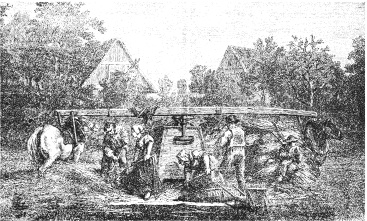American agriculture transformed in the 20th century from labor intensive to highly mechanized in the 21st century. One hundred years ago, farming took place in many small rural farms near more than half the U.S. population lived. Farms employed 41% of the U.S. workforce in 1900, and 21% in 1930 in the U.S.A.

Today, efficient farms employ under 2% of U.S. workers. One hundred years ago, approximately 22 million work animals were used and today 5 million tractors have replaced horses and mules of earlier days. The agricultural sector of the 21st century, on the other hand, is concentrated on a small number of large, specialized farms in rural areas where less than a fourth of the U.S. population lives.
One debate about U.S. farm programs holds that current policies were designed for a period in American agriculture that does not exist today. The farms, farm based families, and the communities that depend on agricultural income changed over the last century. So, it follows that the efficacy of policies with roots in an agricultural economy should be re-examined.
Similarly, the debate about U.S. healthcare focuses to some extent on differences in the U.S. population today vs. when many of the policies that shape the healthcare economy were first enacted.
In both industries, incentives were developed to make it less attractive for small providers and more attractive for highly efficient, automated providers with scale. The industrial revolution introduced an era of specialization that is pervasive in economic, financial, and management thinking today. The difference in healthcare, vs. manufacturing or farming is that higher productivity while maintaining or increasing quality has not been achieved.
In agriculture, technological development and market integration created change. U.S. farm programs changed in the last 40 years along with the evolution of new economic and political circumstances. (Source: http://www.ers.usda.gov/media/259572/eib3_1_.pdf) But a focus on income support has remained constant. We can assume that based on recent U.S. policy certain incentives and regulations will continue in healthcare and that the general effect will be to encourage scale and specialization. The main difference between healthcare and agriculture is that interoperability is essential for the former and will create cooperatives focused on data sharing just as in agriculture smaller providers have historically joined forces to achieve economies of scale and reduce redundant processes.
Since “quality” in healthcare correlates directly to “outcomes” and patient health, one of the biggest determinants of whether healthcare efficiency can be increased while increasing quality will be interoperability. U.S. healthcare policy has focused on interoperability with electronic health records, Health Information Exchanges (HIEs) and other initiatives. The realization of a return on these investments is likely to take decades, just as it did in Agriculture.
Meanwhile, daunting and disruptive regulations are making it more difficult for small health care providers to remain independent.
